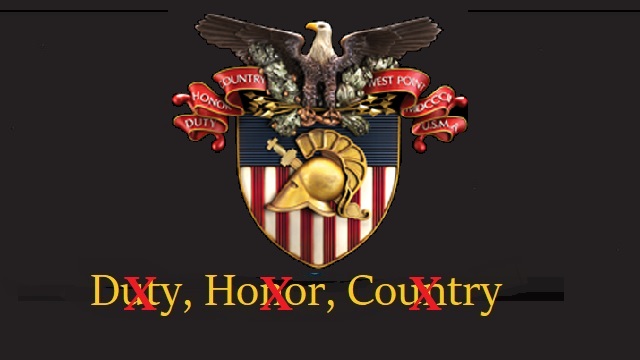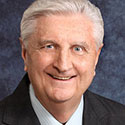ACTION ALERT: West Point Official Mission Statement Eliminating ‘Duty, Honor, Country’
By Royal A. Brown III

”Duty, Honor, Country,” a striking expression of West Point’s time honored ideals, is the motto of the U. S. Military Academy and is embedded in its coat of arms.
Though not as old as the institution they represent, the USMA coat of arms, also referred to as the seal, and motto have a long and interesting history.
According to archival records, the coat of arms and motto were adopted in 1898. Col. Charles W. Larned, professor of drawing headed a committee to design a coat of arms for the Academy and stated several criteria for the design. The committee decided that the design should represent the national character of the Academy, it’s military function, its educational function and its spirit and objectives.
Symbolism in the Coat of Arms
The committee began with the creation of an emblem that consisted of a sword, a universal symbol of war, and the helmet of Pallas Athena, a fully armed mythological goddess, is associated with the arts of war, and her helmet signifies wisdom and learning. The emblem is attached to a shield, bearing the arms of the United States, and on the shield’s crest is a bald eagle, the national symbol. The eagles claws hold 13 arrows representing the 13 original states and oak and olive branches, traditional symbols of peace.
Duty, Honor, Country
The eagle is grasping a scroll bearing the words “West Point, MDCCCII (1802), USMA,” and the motto, “Duty, Honor, Country.” The motto as such was never previously stated, but in writings of early superintendents, professors and graduates, one is struck by the recurrence of the words “duty,” “honor” and “country.” Colonel Larned’s committee believed Duty, Honor, Country represented simply, but eloquently, the ideals of West Point.
The committee did not express an opinion as the relative importance of the three words; however, there is perhaps significance in the fact that “honor” is in the center of the motto. As Maj Gen Bryant Moore noted in a 1951 article in Assembly Magazine, “honor” forms the keystone of the arch of the three ideals on which West Point is founded.
The coat of arms was used without change until 1923, when Captain George Chandler, of the War Department, pointed out to the Superintendent Brig. Gen. Fred Sladen that the eagle and the faced the heraldic sinister side. The helmet, eagle’s head and sword were soon turned to their current position.
Since 1923, the coat of arms has been in regular use at West Point and is carved on many of the older buildings. In 1980, the coat of arms was registered with the Library of Congress as an “identifiable logo” for the Academy.
Another tradition the woke Lieutenant General Steve Gilland, the Superintendent of the United States Military Academy at West Point and his Marxist bosses are trying to eliminate the motto Duty, Honor, Country.
This is an “Action Alert”
Col. (Ret.) Bill Prince, President of the MacArthur Society of West Point Graduates, attended the 07 March West Point Board of Visitors meeting, at the Library of Congress in Washington DC.
Early in the meeting, current Superintendent LTG Steven W. Gilland announced a major change to the Academy’s Official Mission Statement. Expunged is the commitment to the approximately 125-year-old motto of Duty, Honor, Country.
LTG Gilland advised that in its place members of the Corps of Cadets would be “…committed to the Army Values…’’’ The seven Army values are not listed in the Mission Statement, but LTG Gilland remarked that Duty, Honor, Country were pretty much subsumed under the seven Army values. (Col. Prince’s comment: Duty and honor are two of the seven; Country does not make the cut.)
Meeting organizers supplied printed 12 page agenda packets to Board members and their staffs, but not the visitors, me being one, so we took the opportunity to grab agenda packets from vacant chairs. LTG Gilland advised, and the agenda packet specifically stated (page 4), that the new verbiage has been validated as an “Army Senior Leader Approved Mission.” Applicable briefing slide.
There is no identification of which Senior Army Leader found fault with Duty, Honor, Country. Not even the GOP members of the committee raised any objections.
Quickly, the briefing slides moved to the impacts of potential short-term and long-term lapses in funding.
Click here to view all briefing slides.
ACTION
If you are concerned, as we in the MacArthur Society certainly are, that there is an element at the Academy, and likely in the chain of command above, which wants to eradicate foundational principles which have stood the test of time, then I’m asking you to join me in sending an email to VP for Alumni Services Terence Sinkfield ’99 at terence.sinkfield@wpaog.org (845-446-1513).
Three questions occur to me:
Who is the “Army Senior Leader” who expunged Duty, Honor, Country from the Mission Statement?
Did this officer receive direction from above in his chain of command to take this action?
Did the AOG (in its mission to represent the members of the Long Grey Line) provide preliminary input to this decision and if so what input.
The MacArthur Society’s Mission is to preserve, defend, and advocate for West Point’s history, purpose, and principles of Duty, Honor, and Country. Clearly our Society must take action on this issue. Donations are of overriding importance in helping us stay in the fight. Join us!
Thank you for your support of the mission.
Col. (Ret.) Bill Prince ’70
President
MacArthur Society of West Point Graduates

This article is courtesy of DrRichSwier.com, an online community of citizen journalists, academics, subject matter experts, and activists to express the principles of limited government and personal liberty to the public, to policy makers, and to political activists. Please visit DrRichSwier.com for more great content.

